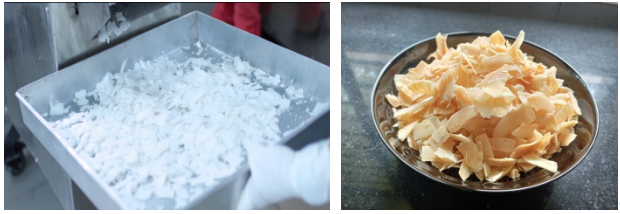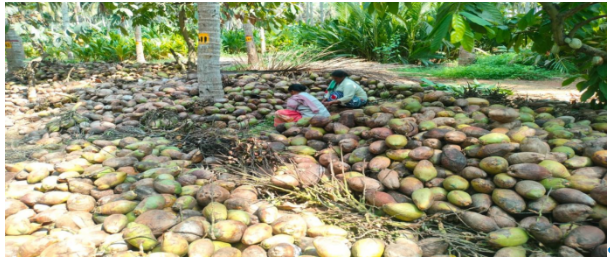|
|
|
You can get e-magazine links on WhatsApp. Click here
|
|
|
|
|
|
Coconut - A zero-waste cash crop with diverse portfolio
|
|
Friday, 11 July, 2025, 16 : 00 PM [IST]
|
|
Aneeta Joy, Resmi D S & Dr Ankur Kumar
|
Coconut (Cocos nucifera), also known as the tree of heaven, is a perennial crop that is widely seen in the Asian Pacific regions and considered a zero-waste cash crop. Latest studies report that India ranks first in the world in coconut production with 21,374 million nuts per hectare. Karnataka, Tamil Nadu, Kerala, and Andhra Pradesh are the major coconut-producing states in the southern region of India. This crop is differentiated from other horticulture crops due to its versatility and allied applications in a variety of food, drinks, fuel, fibre, and nutraceutical applications.
Coconut is an integral part of the rural population in Southern India, which helps their livelihood. The coconut palm embodies the real concept of sustainability through its ability to provide diversified products without depleting natural resources. Almost all the portion of the palm, from the crown to the root, has a use. The fruit provides meat, water, milk (the aqueous extract from the coconut kernel), shell, and fibre. Its applications range from food to other value-added non-edible raw materials, making it a vital economic resource in many tropical regions.
Activated carbon, shell powder, fibre, charcoal, handicrafts, furniture, and roofing support are some of the major non-food materials produced from the coconut fruit or its palm. At the same time, these products have a lot of export opportunities. Over the last five years, coconut product exports from India have reported a significant increase.
However, high-quality standards are crucial for global market success to ensure consumer confidence in product quality and safety. Apart from exporting raw coconut, it's now time to strategise and move towards processed value-added products. This shift enhances export revenue and strengthens India’s position as a quality, value-added coconut product supplier.
Recent trends in coconut-based value-added products: The rising demand for natural, plant-based, and health-oriented food products has opened new opportunities for coconut value addition. Use of advanced processing and preservation techniques can help this crop diversify into value-added products. Though it possesses the major nutrients, including carbohydrates, protein, fat, minerals, and dietary fibre, the recent focus is to explore its potential as a functional food source. The coconut's versatility offers vast opportunities, from its water to the oil in its flesh. Value addition of coconut plays a vital role in developing new products to boost the income of all stakeholders involved in its cultivation, processing, and value addition.
Coconut structure is enveloped with three layers: exocarp, mesocarp, and endocarp, which provide protection, durability, and resistance to the severe environmental conditions. The exocarp, the outermost layer of the coconut, is usually yellow-green to yellow-brown in colour, forming the "husk" along with the mesocarp. The husk is widely used for the production of coir and coir products. Cocopeat, which is a byproduct of husk, is used as a soil media and also considered a rich source of essential nutrients to improve soil fertility. The endocarp, the hard shell enclosing the coconut meat and the water, is mainly utilised to produce activated carbon, charcoal, shell powder, and eco-friendly products, including handicrafts, crockery/cutlery products.
The coconut kernel, the major edible part of the coconut, is widely used as a food product and for oil extraction. Coconut kernel is the most utilised part in the production of value-added products. Among the kernel products, the most widely used value-added product is coconut oil, extracted from the dried coconut meat (copra). Coconut oil has gained major attention due to its therapeutic effects, owing to the presence of medium-chain fatty acids, which are thought to support metabolism and improve cholesterol levels. Coconut oil is used in cooking, skincare, and hair care products due to its moisturising properties.
Virgin coconut oil is considered an elite oil due to its dual benefits as both a cosmetic oil and a health supplement. Extracted from fresh coconut meat without any chemical processing, virgin coconut oil retains its natural nutrients and antioxidants. Medium-chain triglycerides, particularly lauric acid present in oil, are known to boost the immune system, assisting in weight management, improving metabolism, and helping in preventing cardiovascular disease.
Coconut milk is another plant-based coconut product, the aqueous extract from mature coconut meat. Coconut milk serves as a rich, creamy base for soups, curries, and desserts, especially in Asian, Caribbean, and Southeast Asian cuisines. When the milk is processed further to remove some of the water, it becomes coconut cream, a high-fat, thicker, and richer ingredient often used in desserts to add creaminess. Coconut milk or cream is often used as a dairy alternative and has a significant role in a vegan-lactose-free diet. Similarly, coconut butter, which is made by blending dried coconut meat into a smooth, spreadable paste, is another popular ingredient in food, nutraceutical and cosmetic industries. Coconut flour is a good alternative for those looking for gluten-free options. It is processed from a dried coconut powder left after the milk extraction. Coconut flour is high in fibre and low in carbohydrates. Coconut flour has also been used in the nutraceutical sector to formulate fibre supplements.
Additionally, dried and shredded coconut kernel in the form of desiccated coconut or coconut flakes is a staple ingredient in the bakery industry. Whether sprinkled on top of cakes or used in coconut-based desserts, desiccated coconut brings a delightful tropical flavour and texture to a wide range of products.
Tender coconut water is another refreshing drink packed with electrolytes, vitamins, and minerals. Coconut water has gained popularity as a low-calorie, natural health beverage and a healthier alternative to sugary, carbonated and synthetic drinks, offering natural hydration. Its high potassium content helps replenish electrolytes, making it a favourite among athletes and fitness-oriented individuals.
Tender coconut water in packed form and also minimally processed forms is gaining popularity in the sports and health sectors. Another exciting offering from young coconuts is tender coconut, which is a semisolid extract inside young, immature coconuts. Tender coconut is soft, mildly sweet, and can be eaten directly or used in desserts, beverages, and salads. Matured coconut water is considered an underutilised by-product in coconut processing industries, and can be transformed into valuable products like coconut vinegar and nata de coco, a jelly-like substance that has become popular in desserts and beverages. Both of these products are produced through the fermentation of coconut water and have carved out their own position in the modern food and beverage market, offering unique flavours, tastes, and functional benefits.
Coconut inflorescence sap, known as neera, is a naturally sweet, nutrient-rich drink collected from the coconut inflorescence. It is packed with added vitamins, minerals, and antioxidants, making it a healthy alternative to synthetic sugary beverages. Neera can be processed into products like sugar, syrup, jaggery, and vinegar. With rising global demand for natural and organic foods, neera has strong export potential. Proper processing and branding can turn it into a significant income source for farmers and a premium product for health-oriented consumers.
Other products that can be made using coconut kernel or coconut milk as the primary ingredient include coconut chips (Figure 1), coconut chunks, coconut cookies, coconut chocolates, coconut clusters, coconut burfi, coconut ladoo, flavoured coconut milk, coconut pickle, and coconut milk yoghurt. These products have a significant potential for consumers seeking natural, lactose-free, gluten-free, and vegan options. These products' versatility and nutritional benefits cater to the growing demand for plant-based, allergen-free foods.
Government measures to uplift coconut value addition: In the country, the government promotes coconut value addition through multiple schemes. The Coconut Development Board (CDB) leads initiatives like the Technology Mission on Coconut (TMOC), offering financial support for processing units producing coconut products to implement or adopt new technology. The Mission for Integrated Development of Horticulture (MIDH) supports post-harvest infrastructure, while the PMFME scheme under Atmanirbhar Bharat provides credit-linked subsidies for micro food enterprises, including branding and capacity building. The National Horticulture Board (NHB) assists in setting up cold storage and technology upgrades, and APEDA supports exporters through infrastructure, branding, and certification aid. Coconut enterprises also benefit from MSME schemes, with additional incentives provided by coastal states like Kerala, Tamil Nadu, and Karnataka.
(The authors are from Coconut Institute of Technology, Coconut Development Board, Ministry of Agriculture and Farmers Welfare, Government of India, South Vazhakulam, Aluva. They can be reached at ankur.k@coconutboard.gov.in)

Figure 1. Coconut slicing and chips making at the Coconut Institute of Technology

Figure 2. Selection of seed nuts at DSP Farm, Vegiwada, Coconut Development Board
|
|
|
|
|
|
|
|
|
|